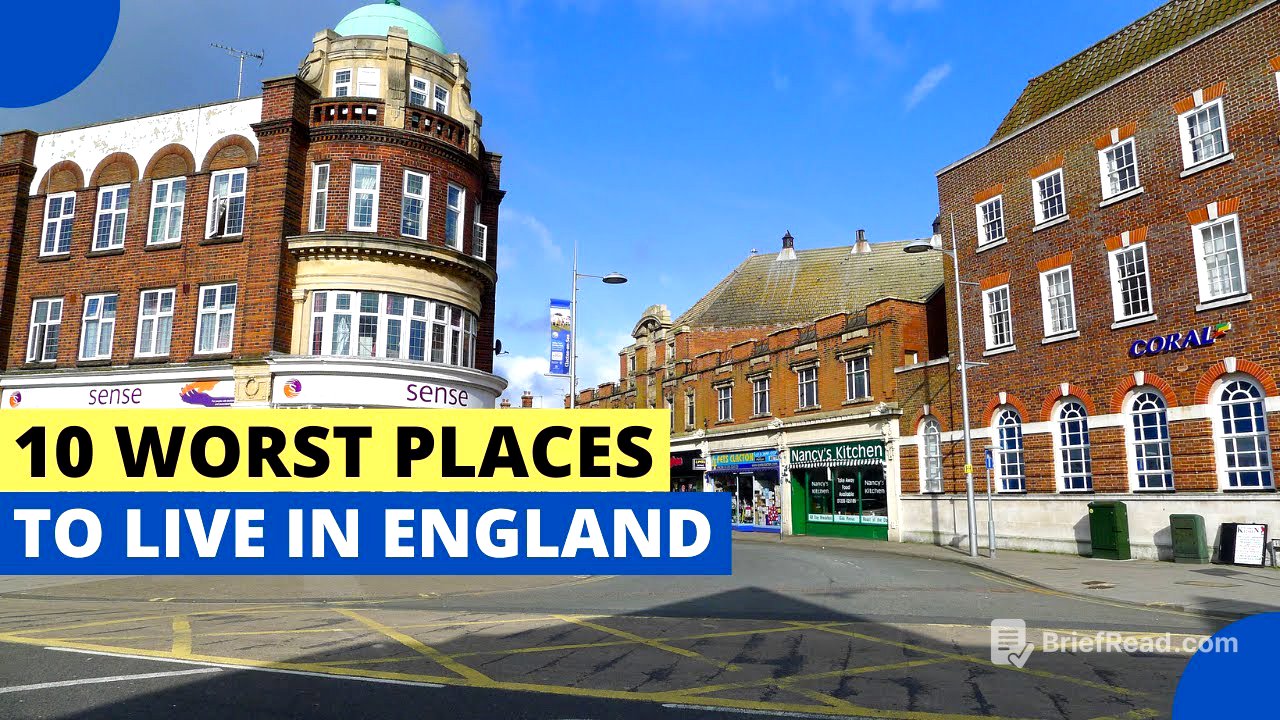TLDR;
This video explores the ten worst places to live in England, highlighting the challenges each location faces. These range from high crime rates and economic struggles to inadequate public services and social issues. The video emphasizes that while each place has its charms, potential residents should consider these factors before deciding to move.
- High crime rates and economic struggles
- Inadequate public services
- Social issues and lack of community spirit
Intro [0:08]
The video introduces the concept of exploring the least desirable places to live in England, based on various surveys and rankings. It mentions that factors such as climate challenges and economic downturns contribute to these rankings, advising viewers to consider these aspects before moving.
Clacton-on-Sea [0:43]
Clacton-on-Sea, a coastal town in Essex, is listed as one of the least desirable places to live due to high crime rates, including vandalism and theft, and a struggling economy with limited job opportunities. Many residents feel the town needs investment and revitalization, though it still offers beautiful coastal views and traditional seaside charm.
Blackpool [1:38]
Blackpool, known for its promenade, tower, and entertainment, faces challenges such as high unemployment and poverty. The town also struggles with mental health and addiction issues. Residents have expressed a need for improved services and amenities to enhance community and quality of life, calling for sustainable development and better community health initiatives.
Portsmouth [2:35]
Portsmouth, a port city with maritime heritage, is noted for social and economic challenges, including high crime rates and antisocial behavior, which impact safety. The education sector also faces scrutiny, with some schools struggling to achieve desired outcomes. Potential residents should consider these issues despite the city's vibrant lifestyle and historical backdrop.
Peterborough [3:22]
Peterborough, known for its transport links and historical landmarks, faces challenges like increased traffic congestion and a lack of community spirit. Residents feel the city's growth has outpaced infrastructure and services, leading to frustration. Some neighborhoods also report higher crime rates, though its proximity to Cambridge and London makes it attractive for commuters.
Hull [4:14]
Hull, in East Yorkshire, has faced challenges regarding livability despite revitalization efforts like the 2017 City of Culture. Reports indicate ongoing socioeconomic disparities, with high unemployment rates and issues with public services, including healthcare and education. The city faces an uphill battle in improving perceptions of overall quality of life, despite its rich culture and community spirit.
Dover [5:02]
Dover, a historic town on the southeastern coast known for its white cliffs and ferry links to France, is flagged for socioeconomic issues, including a struggling economy and high unemployment. The town's reliance on tourism and port proximity makes it vulnerable to economic shifts. Residents have concerns about public services like healthcare and education, affecting overall satisfaction.
Luton [5:47]
Luton, north of London, has a multicultural community but is known for high crime rates and social issues. Residents express concerns about safety and public service quality. Traffic congestion is problematic due to its proximity to London, impacting daily life despite easy access to the capital.
New Addington [6:32]
New Addington, in the London borough of Croydon, is noted for higher than average crime rates and struggles with local amenities. A lack of public transport options makes commuting challenging, and social issues can lead to isolation and dissatisfaction. While some appreciate its quieter atmosphere, others find it lacking in opportunities and vibrancy.
Slough [7:22]
Slough, near London, is known for its industrial roots and diverse population but faces challenges like high levels of homelessness and safety concerns. Residents worry about the local education system and healthcare access. The balance between urban development and community feel is a work in progress, potentially deterring those seeking a stable environment. Slough has a rich history, cultural diversity, parks, and open spaces, and is working to address its challenges through investment in infrastructure, education, and community programs.
Sheerness-on-Sea [9:03]
Sheerness-on-Sea, on the Isle of Sheppey in Kent, is listed as the least desirable place due to struggles with crime rates and concerns about local amenities. Residents cite the need for improved services and recreational facilities, which affect daily life. Economic and social issues contribute to dissatisfaction, posing hurdles to quality of life despite its coastal living potential.









